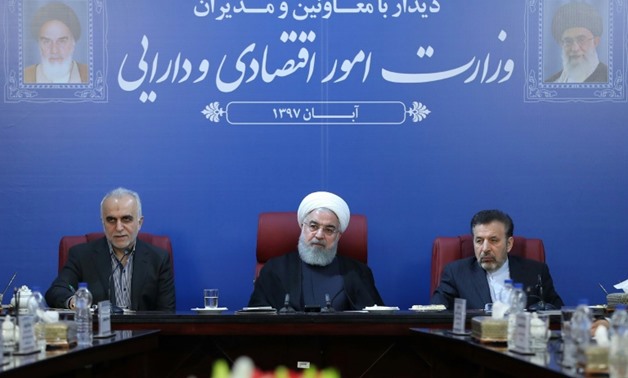
Iran's President Hassan Rouhani (C), seen at a cabinet meeting in Tehran in a handout picture provided by the Iranian presidency on November 5, 2018, said the Islamic republic "will proudly bypass sanctions" by the United States
PARIS - 6 November 2018: The United States vowed Monday to be "relentless" in countering Iran as sweeping sanctions took effect, but the Islamic republic defiantly promised to stand up to the "bullying" by Washington.
President Donald Trump's administration nonetheless issued eight exemptions from its demand on all countries to stop buying Iran's oil, its largest export, amid widespread global opposition to the unilateral US sanctions.
Six months after Trump pulled out of an international agreement on ending Tehran's nuclear program, Secretary of State Mike Pompeo said the ultimate US goal was for Iran to make a "180-degree turn" and abandon its "current revolutionary course."
While stopping short of urging regime change, he reiterated his demands for Iran to end policies rooted in the 1979 Islamic revolution including its support for regional proxies such as the Lebanese militia Hezbollah and its development of missiles.
"We hope a new agreement with Iran is possible, but until Iran makes changes in the 12 ways I listed in May, we will be relentless in exerting pressure on the regime," Pompeo said.
He said the sanctions -- which took effect on the 39th anniversary of Iranian zealots' seizure of the US embassy following the ouster of the pro-US shah -- intended to "starve the Iranian regime of the funds it uses to fund violent activity throughout the Middle East and around the world."
UN inspectors say Iran is abiding by an agreement reached with Trump's predecessor Barack Obama to draw down its nuclear program. That deal was backed by European powers, Russia and China and sealed by a UN Security Council resolution.
"I announce that we will proudly bypass your illegal, unjust sanctions because it's against international regulations," Iran's President Hassan Rouhani said in a televised speech as the sanctions took effect.
"We are in a situation of economic war, confronting a bullying power. I don't think that in the history of America, someone has entered the White House who is so against law and international conventions," he added.
In one of Tehran's bazaars, there was anxiety over the future.
"The shadow of the sanctions has already affected the economy in a disastrous way, people's purchasing power has plunged," said Ehsan Attar in his herbal remedy shop.
- 'Act on your commitments' -
Rouhani said four countries had approached him during his visit to New York for the UN General Assembly in September offering to mediate with the US, but he turned them down.
"There is no need for mediation. There is no need for all these messages. Act on your commitments, and we will sit and talk," he said.
Iran's ambassador to the United Nations, Gholamali Khoshroo, asked the world body Monday to hold the United States to account, although there was no indication that member-states would take up the issue.
The latest tranche of US sanctions aims to significantly cut Iran's oil exports -- which have already fallen by up to one million barrels a day since May -- and cut off its banks from international finance.
The Belgian-based SWIFT banking network, the backbone for international monetary transfers, said Monday it had suspended several Iranian banks from its service.
The International Monetary Fund forecasts that US sanctions will cause Iran's economy to contract 1.5 percent this year and 3.6 percent next year -- pain that Trump has boasted about as he touts his record ahead of Tuesday's congressional elections.
Iran's economy was already suffering major structural problems -- including widespread corruption, weak investment and a banking sector laden with toxic assets -- before Trump walked out of the deal.
Rouhani's plan since his election in 2013 was to boost the economy by rebuilding ties with the world and attracting billions of dollars in foreign investment -- a strategy that now looks in tatters.
- Exemptions to sanctions -
The United States issued eight waivers to its ban on buying Iranian oil -- to China, India, Italy, Greece, Japan, South Korea, Taiwan and Turkey.
Trump said he wanted to go "a little bit slower" on oil sanctions to avoid a price hike, which is especially sensitive in the United States.
"I'm not looking to be a great hero and bring it down to zero immediately," Trump told reporters, saying the move "would cause a shock to the market."
And despite Trump's repeated declarations that the Iran deal has been a "disaster," the United States announced exemptions that preserve civilian nuclear cooperation started under the accord.
The activities at Bushehr, Iran's only nuclear power station, as well as the Fordow enrichment plant and the Arak heavy water reactor, will be allowed "to continue under the strictest scrutiny to ensure transparency and maintain constraints on Iran," a State Department statement said.
The other parties to the nuclear deal -- Britain, France, Germany, China and Russia -- have vehemently opposed the US move and vowed to keep alive the accord, technically known as the Joint Comprehensive Plan of Action.
The only support for the US position has come from Iran's regional rivals, notably Saudi Arabia and Israel, whose prime minister, Benjamin Netanyahu, hailed the start of sanctions as "a historic day."
Foreign companies and banks are largely unwilling to make enemies of the US Treasury, and most international firms that set up in Iran after the 2015 deal have been forced to leave, including France's Total, Peugeot and Renault, and Germany's Siemens.
"Unfortunately, we were treated dishonorably by both the American and Iranian governments," said Fereshteh Safarnezhad, a 43-year-old teacher, on the streets of Tehran.
"The Americans never really committed to the deal and the Iranian government did not spend the cash it got from the deal on the people."


Comments
Leave a Comment